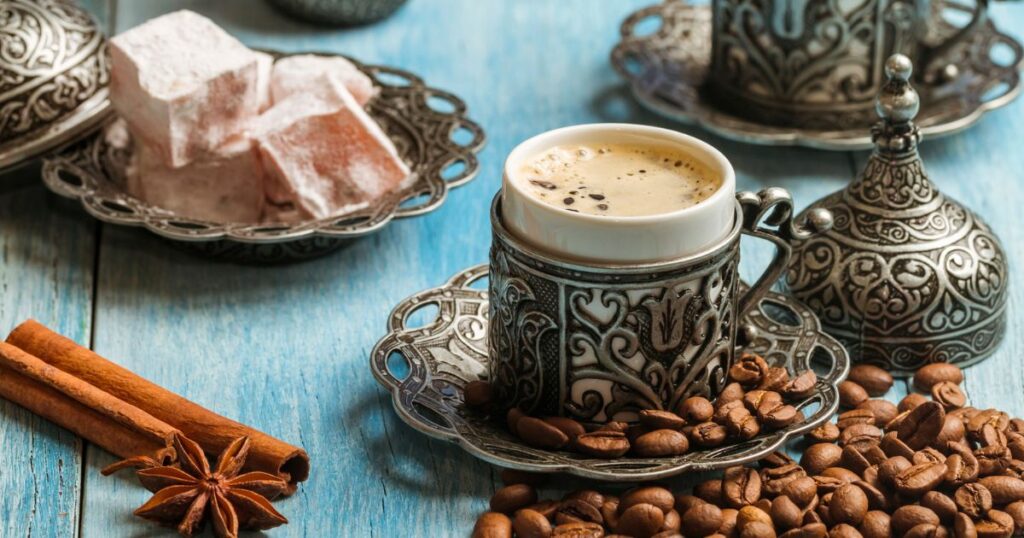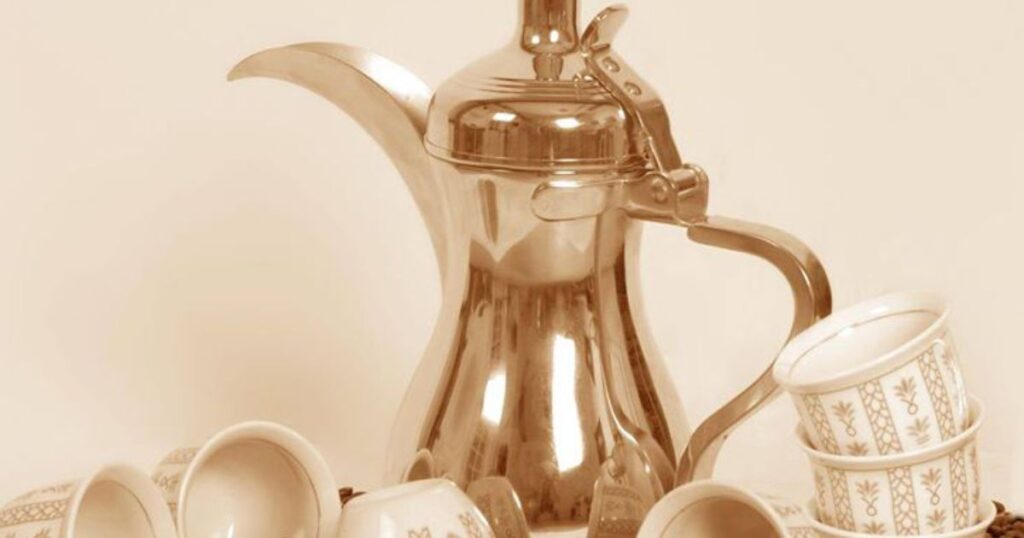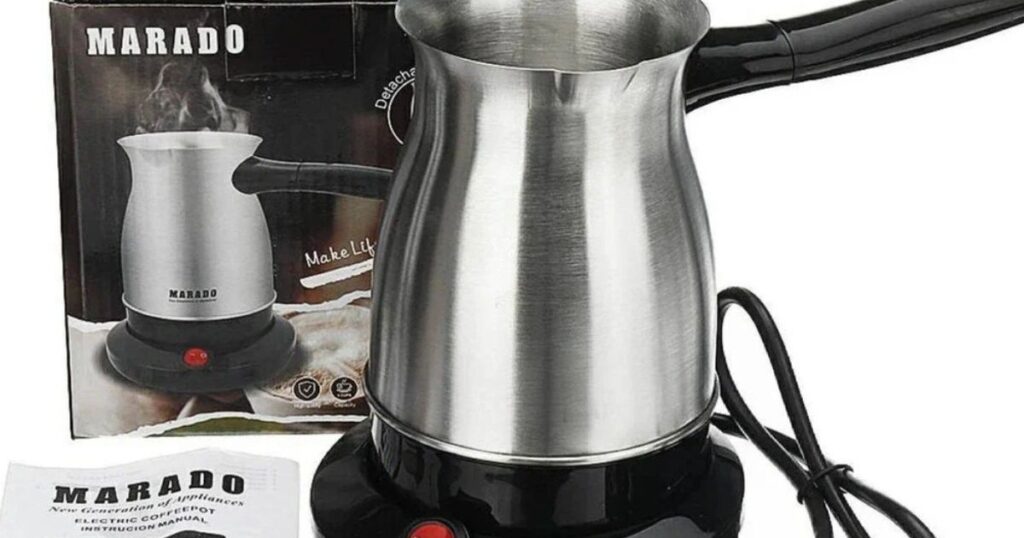Arabian Coffee Simplified: 5-Minute Recipe for Exotic Taste
I’ll never forget the first time I tried Arabian coffee. The rich aroma of freshly ground beans mixed with warm, spicy cardamom instantly captivated my senses. At first sip, I knew I’d stumbled upon something truly special—an exotic, deeply comforting flavor unlike any other coffee I’d ever tasted.
Arabian coffee isn’t just a drink; it’s a story in a cup. Known as Qahwa, this brew captures the essence of Middle Eastern culture. Its exotic aroma and rich flavors make it irresistible. The best part? You can make it in just five minutes.
This simple recipe brings authentic Arabian coffee to your home, no expertise needed. Let’s explore the magic of Qahwa and its timeless tradition.
What is Arabica Coffee? The History of Arabian Coffee
Arabica coffee, often considered the finest variety of coffee, forms the base of most Arabian coffee recipes. Cultivated from the arabica coffee plant, this bean is renowned for its smooth, slightly sweet flavor and lower acidity compared to other types.

The arabica coffee plant thrives in high-altitude regions, producing beans that are cherished worldwide. In Arabic coffee traditions, these beans are typically lightly roasted, allowing the unique flavors to shine.
The light roast also gives the coffee its golden color and a mild, earthy taste that’s distinctively different from Western-style dark roasts.
Coffee in Arabic Culture: A Symbol of Hospitality
Coffee in Arabic traditions is more than a beverage; it’s a symbol of warmth and hospitality. Known as Qahwa, it is often served during gatherings, celebrations, and even casual visits. Sharing Arabian coffee is a gesture of friendship and respect, deeply rooted in Middle Eastern customs.

Prepared with care, Arabic coffee often includes cardamom, saffron, or other spices to enhance its exotic flavor. The aroma of freshly brewed Arabian coffee fills the room, creating an inviting atmosphere that welcomes guests with open arms.
How to Make Arabian Coffee in 5 Minutes
These simple steps can make your Arabian coffee experience a great one.

Step 1: Prepare the Ingredients
Start by selecting high-quality arabica coffee beans. Grind them finely to achieve the best flavor. You will also need water and optional spices like cardamom or saffron for an authentic touch.
Step 2: Boil the Water
In a traditional Arabic coffee pot, known as a dallah, or a small saucepan, bring water to a boil. The amount of water depends on how many servings you plan to make.
Step 3: Add the Coffee Grounds
Once the water reaches a boil, reduce the heat to a simmer. Add the finely ground arabica coffee to the pot. Stir gently to ensure the coffee dissolves evenly.
Step 4: Incorporate Spices
For added flavor, include a pinch of cardamom or saffron. These spices elevate the coffee’s aroma and give it a distinctive Middle Eastern essence.
Step 5: Simmer and Strain
Let the coffee simmer for a few minutes. This allows the flavors to blend perfectly. Once done, strain the coffee into small serving cups to remove any grounds.
Step 6: Serve Hot
Pour the brewed coffee into traditional Arabic coffee cups. Serve it hot and savor the rich, exotic flavors of Arabian coffee. Traditionally, this coffee is enjoyed without sugar to appreciate its natural taste.
Why Choose Arabica Coffee Beans?
Arabica coffee beans are prized for their superior quality and rich taste. They contain less caffeine than robusta beans, making them a preferred choice for those who enjoy a smoother cup. The beans’ natural sweetness and complex flavor profile perfectly complement the spices used in Arabic coffee.
The cultivation of arabica coffee requires specific conditions, including high altitudes and cooler temperatures. These factors contribute to the beans’ unique characteristics, ensuring every sip is a luxurious experience.
The Health Benefits of Arabic Coffee
Drinking Arabic coffee isn’t just about taste; it’s also good for your health. Rich in antioxidants, it helps combat free radicals in the body. The addition of spices like cardamom further enhances its health benefits, promoting digestion and reducing inflammation.
Studies have shown that moderate consumption of arabica coffee can improve mental alertness and support cardiovascular health. With its low calorie count and natural ingredients, Arabian coffee is a wholesome choice for any coffee lover.
Qahwa: A Timeless Tradition
Qahwa, or Arabian coffee, is deeply ingrained in the culture and history of the Middle East. Its preparation and serving style reflect centuries-old traditions that have been passed down through generations.

From the ornate dallah to the delicate serving cups, every aspect of Qahwa speaks to its cultural significance. If enjoyed in a bustling market or a quiet home, Qahwa brings people together, fostering connections and conversations. This timeless tradition continues to be cherished across the Arab world and beyond.
Arabian coffee culture
Arabian coffee is a symbol of hospitality and tradition. Known as qahwa, it’s a special part of life in the Middle East. Making Arabic coffee often involves spices like cardamom and saffron, which add a unique flavor. Served in small cups, it’s meant to be enjoyed slowly, savored, and shared.

Offering coffee in the Arab world is a sign of respect. Whether with family, friends, or guests, it’s a way of connecting. Each cup represents a bond, a moment shared.
Arabian coffee isn’t just a beverage; it’s a tradition that brings people together, creating a sense of belonging. Every sip carries with it a deep cultural significance, making it a truly exotic experience.
A Note on Etiquette
Drinking Arabian coffee is an art that extends beyond its rich flavor. Tradition calls for small, deliberate pours into a delicate finjan, a cup without a handle. It’s considered respectful to wait for your host to serve you and to hold the cup with your right hand.

Take a moment to admire the coffee’s distinct aroma before tasting it slowly, letting the experience unfold sip by sip. This small gesture reflects your appreciation for the effort that goes into preparing this iconic beverage.
The practice of offering Arabian coffee often involves multiple servings, each poured in small amounts. When you feel content, a slight tilt of the cup is enough to politely signal that you’ve had enough.
This simple cue maintains the warm hospitality while letting everyone at the gathering enjoy the coffee at their own pace. Such customs highlight the cultural depth behind the coffee, turning each sip into a shared moment of respect and tradition.
Arabian Coffee Brewing Methods
Arabian coffee, known as “qahwa,” is a cultural staple renowned for its light roast and aromatic flavor. Unlike darker Western roasts, Arabian coffee beans are lightly roasted to preserve their natural floral and citrus notes. This gives the coffee a unique profile—less bitter, more delicate, and fragrant.

Brewing in a Dallah: A Timeless Method
Traditionally, Arabian coffee is brewed in a dallah, a uniquely shaped pot with a long spout. The coffee grounds are added directly to simmering water, creating a slow, gentle infusion that draws out the beans’ subtle flavors. This brewing method, passed down through generations, ensures that each cup is rich, aromatic, and smooth.
Serving and Enjoying
Once brewed, Arabian coffee is served unfiltered in small cups, often accompanied by dates. This pairing not only enhances the coffee’s mild sweetness but also balances its earthy tones. The presentation—no sugar, no milk—keeps the coffee’s natural character intact, offering a simple yet sophisticated taste experience.
How to make Qahwa coffee
You can follow below mentioned steps to make qahwa coffee:
Ingredients You’ll Need
For authentic Qahwa coffee, you’ll need Arabian ground coffee, cardamom pods, and water. These simple, traditional ingredients create the signature flavor that sets Qahwa apart.
Brewing the Coffee
Start by combining the ground coffee and water in a dallah or small pot. Heat the mixture gently over low heat. Once it begins to simmer, add crushed cardamom pods. Stir the brew occasionally to ensure the spices infuse evenly, and let it simmer slowly to enhance the flavor.
Serving and Enjoying Qahwa
When the coffee is ready, allow it to rest briefly so the grounds settle. Serve in small, handle-less cups for a traditional touch. To complement the rich flavor, many enjoy Qahwa alongside sweet dates or on its own.
Making Arabic Coffee with an Electric Turkish Coffee Maker
Making Arabic Coffee with an Electric Turkish Coffee Maker. Following are the easy steps:

Choosing the Right Coffee Beans
Select freshly ground Arabian coffee beans, preferably medium roast, for a delicate, spiced flavor profile. Adding finely ground cardamom enhances the traditional taste.
Preparing the Coffee
Measure coffee and water carefully, then mix the cardamom into the coffee grounds. Place the mixture into the pot of your electric Turkish coffee maker.
Brewing with an Electric Turkish Coffee Maker
Turn on the maker and let it heat slowly. The gradual warming process develops the coffee’s full aroma and flavor.
Serving Arabic Coffee
Once the coffee foams, pour it into small, traditional cups. Serve alongside dates or sweet treats for an authentic touch.
How to order an Arabian coffee
When you’re craving authentic Arabian coffee, you can order it with ease. Just ask for “qahwa” and choose your favorite flavor. I usually go for the classic cardamom touch—it’s warm, fragrant, and feels so traditional.
Sometimes I’ll switch it up and ask for saffron or rosewater. The staff are usually happy to help, and I love seeing the coffee served from a beautiful dallah pot.
One tip: if you like your coffee a bit sweet, let them know ahead of time. They might serve it alongside dates, which add a nice natural sweetness. I also like to ask about the beans and roast level—it makes me feel more connected to the experience. It’s not just coffee; it’s a moment to enjoy.
Conclusion: Embrace the Exotic Taste of Arabian Coffee
Arabian coffee offers a unique blend of tradition, flavor, and simplicity. By using premium arabica coffee beans and a few aromatic spices, you can create an authentic experience in just 5 minutes. You can call it Qahwa, Arabic coffee, or Arabian coffee. This drink is a testament to the rich heritage and vibrant flavors of the Middle East.
Now that you know the secrets to making Arabian coffee, why not try it for yourself? Share this timeless tradition with your friends and family, and savor the exotic taste that has captivated coffee lovers for centuries.
FAQs
What is Arabian Coffee Made of?
Arabian coffee is made from lightly roasted Arabica beans, which are finely ground to a delicate powder. The light roast preserves the beans’ natural flavors, giving the coffee its unique taste. It is often infused with aromatic spices like cardamom for an exotic touch.
What is Arabic Coffee Good for?
Arabic coffee can help curb your appetite and keep you feeling full for longer. Its natural compounds promote a sense of satiety, reducing the urge to snack. Enjoying a cup can support mindful eating habits and overall health.
What is the Famous Arab Coffee?
The famous Arab coffee is Qahwa, a traditional beverage deeply rooted in Middle Eastern culture. Known for its unique flavor, it is often prepared with lightly roasted arabica beans and aromatic spices like cardamom.
Is Arabian Coffee Stronger?
Arabian coffee is known for its strength and bold taste. It contains up to 2.7% caffeine, making it more robust than many other types of coffee.
Can I Drink Arabic Coffee While Fasting?
Reducing coffee consumption before fasting is best, as it can dehydrate you. While Arabic coffee itself won’t break your fast, drinking too much may cause discomfort. Moderation is key for staying hydrated and feeling your best.
Can you drink Arabic coffee with milk? Ans: (if you prefer milk, you can add half water and half milk).







